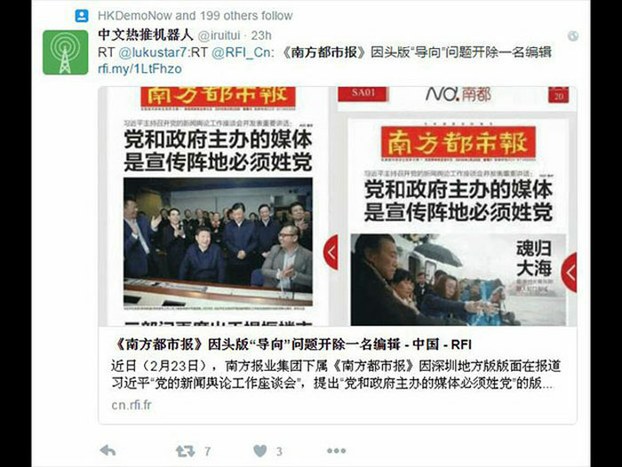
A screen shot of a Tweet shows an edition of the Southern Metropolis Daily with headlines that when read together appear spell out an anti-propaganda message. RFA
An editor at a cutting-edge newspaper in the southern Chinese province of Guangdong was fired and another slapped with an official warning for “political problems” after a recent edition of the paper ran two coinciding headlines that spelled out an anti-propaganda message, sources told RFA.
The offending front page appeared in the Shenzhen edition of the Southern Metropolis Daily on Feb. 20, the day after a high-profile visit by President Xi Jinping to media organizations controlled by the ruling Chinese Communist party.
One headline proclaimed: “At the front-line of propaganda work, state media belongs to the party.”
The second, linked to a separate story about a shipboard ashes-scattering ceremony, made a second, vertical sentence, adding the words: “Soul returns to the sea.”
As Chinese grammar depends on context, the two sentences could be combined to mean “If the media belongs to the party, its soul will be scattered at sea.”
Political insensitivity
According to an internal document leaked online by someone at the Southern Metropolis Daily newspaper in Guangzhou, page editor Liu Yuxia was issued with an “administrative dismissal” over the blunder, while deputy editor-in-chief Wang Haijun was sanctioned for “political insensitivity,” with a black mark on his record.
Former Southern Metropolis reporter Shi Yu confirmed the report, saying that the paper was in dire need of a scapegoat when the scandal broke.
“I know all of the leadership team personally,” Shi said. “This was a mistake, and now they need somebody to take the blame.”
She said Liu would have been working under Wang as page editor on the night of Feb. 19.
“They have received different levels of punishment,” Shi said. “This sort of thing has happened before, but I think that the punishment was too harsh this time.”
Shi said it wasn’t clear that the headline snafu was the result of “political errors” at all.
“I don’t think that’s clear at all, and the punishments were pretty harsh based on the existing rules,” she said. “They’re afraid that people will read more meaning into it, so they have overreacted.”
Daily directives
China’s state media receive daily directives from the country’s propaganda ministry and from propaganda departments at lower levels of government, journalists have told RFA.
The secret orders are often received by phone, although many find their way onto the Internet via social media, and can include instructions from party leadership to boost propaganda on certain topics.
Xi’s Feb. 19 tour of state broadcaster CCTV, the People’s Daily and Xinhua news agency would have been designated a top story at the highest level, and the Southern Metropolis headline acrostic is unlikely to have gone unnoticed in Beijing.
The paper is no stranger to subtle acts of subversion, and its reporting is considered daring in China’s tightly controlled news environment.
Last September, the advertising department printed a full-page black rectangle on its A24 page, prompting some to wonder if the ad was making a sly reference to a lack of democracy in China.
Commentators took to popular Twitter-like service Sina Weibo to speculate over the motivation behind the page, with some pointing out that Sept. 15 is the International Day of Democracy.
Unintentional error
Guangzhou-based online writer Ye Du said he didn’t believe the headline acrostic was intentional, however, as most of the journalists still working at the paper wouldn’t dare to push back against the government.
“We have had several years of crackdowns on the Chinese media, and they started with the Southern Metropolis Daily,” Ye said, adding that the most outspoken journalists had been weeded out following a 2013 strike and protest sparked by the rewriting of a New Year front page editorial in the Southern Weekend newspaper, a stable-mate of the Southern Metropolis Daily.
“A large number of people left the Southern media group back then, and those who were left were meek little things who would never dare to protest,” he said.
Independent political commentator Zhang Enguang said Xi’s tour of party media outlets is further evidence that he is taking China ever closer to a situation that resembles the Cultural Revolution
(1966-1976).
“Before [Xi came to power], I would have said that there was no way China was going to go any further to the left,” Zhang said. “But the crackdowns on political dissidents, including rights lawyer and NGOs … show that he is busy centralizing power.”
“And when he has got all of the power, then we’ll find out the meaning of the phrase ‘power corrupts, but absolute power corrupts absolutely,'” Zhang said.
Reported by Xin Lin for RFA’s Mandarin Service, and by Hai Nan for the Cantonese Service. Translated and written in English by Luisetta Mudie.
